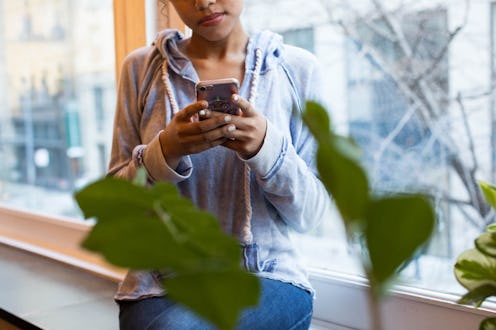Life
The Important Way Online Support Groups Are Making Therapy More Accessible

As our society has become more tech-driven, health care options have made their way from IRL spaces into social media and apps. Online support groups for people with mental health issues and substance use disorders are becoming more widely available, and this is a big deal. Virtual support groups make mental health care more accessible, especially for people who are uncomfortable or unfamiliar with the traditional in-person support group model, or those who may be homebound due to disability.
“I believe peer support, personal or group, is instrumental in allowing individuals suffering from mental health or substance use disorders to re-integrate back into society. Peer support helps the individual in recognizing that their illness can be overcome due to experience sharing,” Dr. Indra Cidambi, the Medical Director at Center for Network Therapy, tells Bustle. “In the event the individual is struggling, peer support can help through skill building, goal setting or mentoring. If these fail, peer support can connect them to resources that can help.”
In August, the app Huddle was launched to provide people with mental health issues — from substance use disorder to body image issues — a social platform to receive and give support from peers struggling with the same issues. Tyler Faux, the co-founder of the app, told Business Insider, “The internet can actually be kind of a lonely place. I think there's an opportunity here to really help a lot of people who otherwise wouldn't have access to these kinds of conversations." Though the app is not intended to be a replacement for therapy, it allows people to anonymously or openly share Snapchat-like stories about their mental health struggles, successes, or advice.
Another app, called Nightlight: Social Meditation, connects users with meditation coaches and communities that foster a virtual, group meditation. Similarly to Huddle, Nightlight helps people connect and cope with mental health issues in a way they may have not had the ability or option to before. Mental illnesses boast the priciest health care costs in the United States, and this can have seriously detrimental effects on the ability or willingness to receive mental health treatment. According a 2017 report released by Mental Health America, around 6.3 million of American adults with mental illness remain uninsured, and 55 percent of American adults with mental illness who are insured reported not receiving any treatment in the past year. Additionally, the report revealed that 20 percent of people who did receive mental health treatment felt the services provided were inadequate, and did not meet their mental health care needs. This means free and readily available support for people with mental health issues is as important as ever before — whether those spaces are online or IRL.
In addition to phone apps, social media platforms such as Instagram and Facebook are home to an abundance of virtual support groups for people with mental health issues. “Peer support groups offer people a sense that they are not alone in their struggles. They offer vital support which can often be received on demand, particularly in terms of online peer support groups,” Dr. Dolores Cimini, the Director of the Middle Earth Peer Assistance Program at University of Albany, says. Sad Girls Club, an Instagram community that has over 20,000 thousand followers, provides mentally ill people with peer support, and posts with resources on how to cope with various issues. “[People] spend a ton of time on the internet, it only makes sense to use online platforms to educate and uplift the mental health community,” Elyse Fox, the founder of Sad Girls Club, tells Bustle. “Online platforms makes finding [mental health] resources easier.”
Despite the advantages of apps and online groups created for people struggling with mental health issues, professionals caution there are drawbacks to be aware of. “Within online peer support groups, as with any online communications, it is sometimes difficult to determine or understand the intent of a particular post or message, making it harder to respond to,” Dr. Cimini explains to Bustle. She adds that another con of online spaces are potential “liability issues, as the facilitator of an online peer support group may not always be able to control or verify the accuracy of information that is posted, or respond to very serious post in an efficient manner — such as those that may include threats of suicide.”
While Dr. Cidambi also expresses the benefits of having accessible mental health support through tech, she tells Bustle she prefers in-person peer support groups. “Real life support is richer, in my opinion, because the individual knows they are talking to a real person who has gone through similar experiences. Real support groups also provide the opportunity to socialize and build a community around the individual suffering from addiction of mental health issues.”
Overall, mental health apps are a great tool that can and should be utilized. However, for people struggling with chronic mental health issues, it is important to have additional therapeutic resources. Whether through individual therapy, in-person support groups, or an app, continuing to build a bigger and better support system is key to recovery.